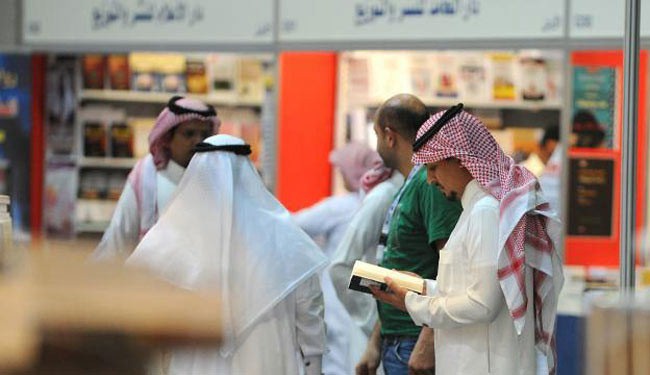
Rasa News Agency reports - Saudi Arabia clamped down on dissent following the wave of Islamic awakening movements across the Arab world in 2011, from which it has so far been spared and has adopted a growingly confrontational stance against the Muslim Brotherhood and other Islamist it has long viewed as a threat to its security.
The local Okaz daily reported on Sunday that organizers at the Riyadh International Book Fair had confiscated “more than 10,000 copies of 420 books” during the exhibition.
Local news website Sabq.org further reported that members of the kingdom’s notorious religious police had protested at “blasphemous passages” in works by the late Darwish, widely considered one of the greatest Arab poets, pressuring organizers to withdraw all his books from the fair, which ended Friday.
The religious police frequently intervene to enforce the kingdom’s strict Wahhabi-based ‘values,’ but the move to ban so many works was viewed as unprecedented.
Similar efforts were adopted against works by one of Iraq’s more famous modern poets, Badr Shaker al-Sayyab, and another Iraqi poet, Abdul-Wahab al-Bayati, as well as those by Palestinian poet Muin Bseiso.
The fair’s organizing committee also banned a book entitled “When will the Saudi Woman Drive a Car?” by Abdullah al-Alami, the Saudi Gazette daily reported.
Saudi Arabia is the only country in the world where women are not allowed to drive.
The ban comes amid escalating tensions between Qatar and three other Persian Gulf Arab monarchies – Saudi Arabia, the United Arab Emirates and Bahrain – which pulled their envoys from Doha earlier this month, accusing it of interfering in their internal affairs.
The decision to withdraw the ambassadors was seen as driven largely by Saudi animosity toward the Muslim Brotherhood of military-ousted Egyptian President Mohammad Morsi and its regional affiliates, which are widely believed to receive support from Qatar.
“Revolution,” a book by Wael Ghonim, a secular Egyptian and former Google executive who became an icon of the country’s 2011 uprising that toppled Saudi ally Hosni Mubarak, was also banned from the Riyadh fair, according to Sabq.
Organizers of the book fair, which began on March 4, had announced ahead of the event that any book deemed “against Islam” or “undermining security” in the US-backed kingdom would be confiscated.
A few days after the fair opened, Saudi authorities closed the stall of the Arab Network for Research and Publishing headed by Islamist publisher Nawaf al-Qudaimi and confiscated all his publications, citing threats to the kingdom’s security.
The crackdown comes after the Interior Ministry published a list of “terror” groups earlier this month in a move that analysts have warned could further curb civil liberties in the absolute monarchy.
On the list is the Muslim Brotherhood, in an obvious show of alliance with Egypt’s current military rulers that toppled the country’s first freely-elected President Morsi in July 2013.
Also on list are al-Qaeda-linked terrorists groups, al-Nusra Front and the Islamic State of Iraq and the Levant (ISIL) which operate in Syria, Iraq and Lebanon and are widely believed to be financed and supplied by elements connected to the despotic Saudi kingdom.